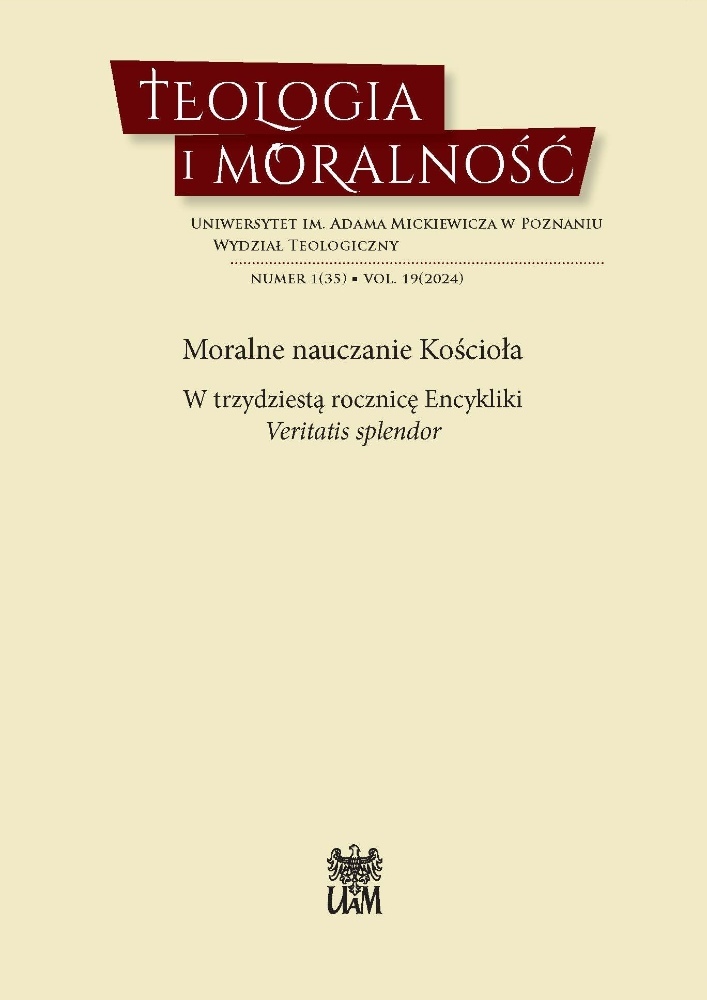Abstract
This article seeks to answer essentially one question: why and in what sense is Veritatis Splendor a controversial encyclical? Applying the hermeneutic method, which attempts to read the text in light of the tradition in which it is embedded and its subsequent reception, the paper provides three answers. The fi rst reason why Veritatis Splendor is controversial is that it is part of a history of strong moral-theological controversies. The second answer concerns its reception: on the one hand, it provoked reactions of strong criticism in various ecclesial circles; on the other, the relationship with the subsequent Magisterium (especially Amoris laetitia) must be correctly interpreted. The third answer is no longer located outside the encyclical but within it. In fact, in chapter two, the encyclical becomes intentionally controversial because it confronts, in its work of discernment, certain tendencies in moral theology today. The conclusion attempts to interpret Veritatis Splendor more broadly. Its profound intention is to be grasped in proposing a broad and liberating vision of morality, at once Christological and rational, in obedience to the conciliar legacy and mandate.
References
Augustine. 2006. Confessions. Translated by F.J. Sheed; introduction by P. Brown, edited, with notes, by M.P. Foley. Indianapolis/Cambridge: Hackett Publishing Company.
Benedict XVI. 2005. Address to the Roman Curia Off ering them his Christmas Greetings, 22.12.
Bonandi, Alberto. 1996. “Veritatis Splendor”. Trent’anni di teologia morale. Milano: Glossa.
Fuchs, Eric. 1994. La morale selon Jean-Paul II. Réponse protestante à une Encyclique. Genève: Labor et fi des.
Fumagalli Aristide. 2019. “Humanæ vitæ”. Una pietra miliare. Brescia: Queriniana.
Garrigues, Jean-Miguel. 2017. “Répondre aux dubia des quatre cardinaux pour développer et préciser la doctrine morale de Veritatis Splendor.” Dans: Une morale souple mais non sans boussole. Répondre aux doutes des quatre cardinaux à propos d’Amoris laetitia, Jean-Miguel Garrigues and Alain Thomasset, 111-168. Paris: Cerf.
Guardini, Romano. 1925. Der Gegensatz. Versuche zu einer Philosophie des Lebendig-Konkreten. Mainz: Grünewald.
Häring, Bernhard. 1994. “A distrust that wounds.” In: Wilkins 1994: 9-13.
John Paul II. 1984. Reconciliatio et paenitentia. Apostolic Exhortation on Reconciliation and Penance in the Mission of the Church Today, 02.12 (= ReP).
John Paul II. 1986. Discorso ai partecipanti al Congresso internazionale di teologia morale, 10.04.
John Paul II. 1991. Centesimus annus. Encyclical Letter on the Hundredth Anniversary of Rerum novarum, 01.05 (= CA).
John Paul II. 1993. Veritatis Splendor. Encyclical Letter on Some Fundamental Questions of the Church’s Moral Teaching, 06.08 (= VS).
Kant, Immanuel. 1996. Anthropology from a Pragmatic Point of View. Translated by Victor Lyle Dowdell, Revised and edited by Hans H. Rudnick, with an Introduction by Frederick P. van de Pitte. Carbondale & Edwardsville: Southern Illinois University Press.
MacIntyre, Alasdair. 2007. After Virtue. A Study in Moral Theory, Third Edition. Notre Dame, Indiana: University of Notre Dame Press.
McCormick, Richard. 1994. “Killing the patient.” In: Wilkins 1994: 14-20.
Mieth, Dietmar (ed.). 1994. Moraltheologie im Abseits? Antwort auf die Enzyklika „Veritatis Splendor”, Freiburg im Br.: Herder.
Paul VI. 1968. Humanae vitae. Encyclical Letter on the Regulation of Birth, 25.07 (= HV).
Ratzinger, Joseph. 1995. “Perché un’enciclica sulla morale? Rifl essioni circa la genesi e l’elaborazione della Veritatis Splendor.” In: Veritatis Splendor. Genesi, elaborazione, signifi cato, ed. Giovanni Russo, seconda edizione aggiornata e ampliata, 9-19. Roma: Dehoniane.
Ratzinger, Joseph. 2004. “Il rinnovamento della teologia morale: prospettive del Vaticano II e di Veritatis Splendor.” In: Camminare nella Luce. Prospettive della teologia morale a partire da Veritatis Splendor, eds. Livio Melina and José Noriega, 35-45. Città del Vaticano: Lateran University Press.
Scola, Angelo. 2006. “Dall’uomo a Cristo. Da Cristo all’uomo.” In: L’antropologia della teologia morale secondo l’Enciclica Veritatis Splendor. Atti del Simposio promosso dalla Congregazione per la Dottrina della Fede. Roma, settembre 2003, 25-41. Città del Vaticano: Libreria Editrice Vaticana.
Selling, Joseph A. and Jan Jans (eds.). 1994. The Splendor of Accuracy. An Examination of the
Assertions made by Veritatis Splendor, Kampen: Kok Pharos.
Selling, Joseph A. 1994. “The Context and the Aurguments of Veritatis Splendor.” In: Selling and Jans 1994, 11-70.
Spaemann, Robert. 1987. Das Natürliche und das Vernünftige. Aufsätze zur Anthropologie. München: Piper.
Tremblay, Réal. 1996. Cristo e la morale in alcuni documenti del Magistero. Roma: Dehoniane. Vidal, Marciano. 1994. La proposta morale di Giovanni Paolo II. Commento teologico-morale all’enciclica Veritatis Splendor. Bologna: EDB.
Wilkins, John (ed.). 1994. Understanding Veritatis Splendor. The Encyclical of Pope John Paul II on the Church’s moral teaching. London: SPCK.
License
Copyright (c) 2024 Stefano Zamboni

This work is licensed under a Creative Commons Attribution 4.0 International License.

